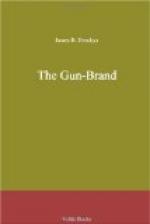“I think she does know,” said Chloe softly, and brushed hot tears from her eyes. Could this be the man whose crimes against the poor, ignorant savages were the common knowledge of the North? Could this be he whom men called Brute—this simple-spoken, straightforward, boyish man who had endured hardships and spared no effort, that the mother he had never known might lie in her eternal rest beneath the green sod of her native land, far from the sights, and sounds that, in life, had become a torture to her soul, and worn her, at last, to the grave?
“Mr.—MacNair.” The hard note—the note of uncompromising antagonism—had gone from her voice, and the man looked at her in surprise. It was the first time she had addressed him without prefixing the name Brute and emphasizing the prefix. He stood, regarding her calmly, waiting for her to proceed. Somehow, Chloe found that it had become very difficult for her to speak; to say the things to this man that she had intended to say. “I cannot understand you—your viewpoint.”
“Why should you try? I ask no one to understand me. I care not what people think.”
“About the Indians, I mean——”
“The Indians? What do you know of my viewpoint in regard to the Indians?” The man’s face had hardened at her mention of the Indians.
“I know this!” exclaimed the girl. “That you are trading them whiskey! With my own eyes I saw Mr. Lapierre smash your kegs—the kegs that were cunningly disguised as bales of freight and marked with your name, and I saw the whiskey spilled out upon the ground.”
She paused, expecting a denial, but MacNair remained silent and again she saw the peculiar twinkle in his eye as he waited for her to proceed. “And I—you, yourself told me that you would kill some of Mr. Lapierre’s Indians! Do you call that justice—to kill men because they happen to be in the employ of a rival trader—one who has as much right to trade in the Northland as you have?”
Again she paused, but the man ignored her question.
“Go on,” he said shortly.
“And you told me your Indians had to work so hard they had no time for book-learning, and that the souls of the Indians were black as—as hell.”
“And I told you, also, that I have never owned any whiskey. Why do you believe me in some things and not in others? It would seem more consistent, Miss Chloe Elliston, for you either to believe or to disbelieve me.”
“But, I saw the whiskey. And as for what you, yourself, told me—a man will scarcely make himself out worse than he is.”
“At least, I can scarcely make myself out worse than you believe me to be.” The twinkle was gone from MacNair’s eyes now, and he spoke more gruffly. “Of what use is all this talk? You are firmly convinced of my character. Your opinion of me concerns me not at all. Even if I were to attempt to make my position clear to you, you would not believe anything I should tell you.”




